人教高中英语 必修3-unit1 Festivals around the world language-points课件 (共55张PPT)
文档属性
| 名称 | 人教高中英语 必修3-unit1 Festivals around the world language-points课件 (共55张PPT) | 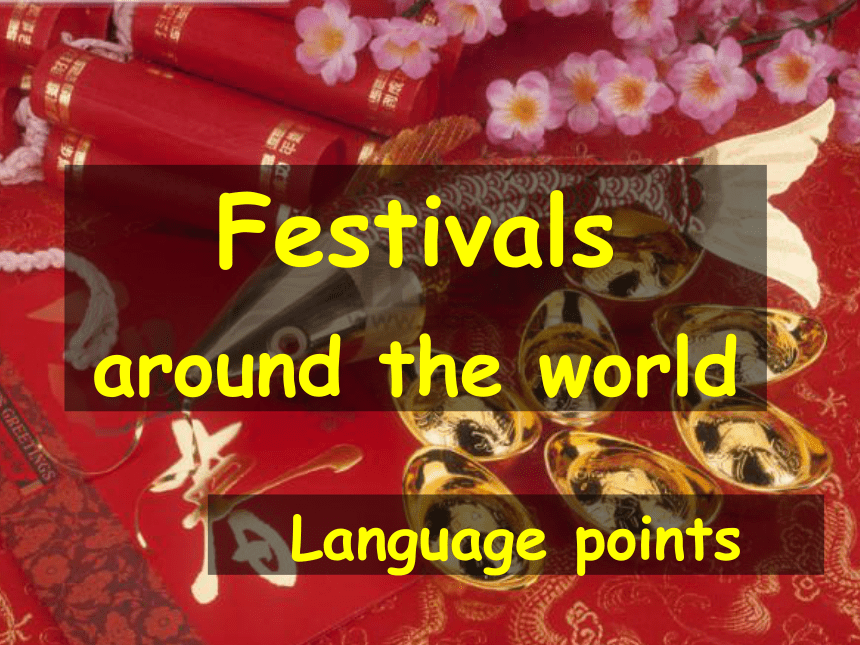 | |
| 格式 | zip | ||
| 文件大小 | 939.0KB | ||
| 资源类型 | 教案 | ||
| 版本资源 | 人教版(新课程标准) | ||
| 科目 | 英语 | ||
| 更新时间 | 2019-02-27 22:59:33 | ||
图片预览

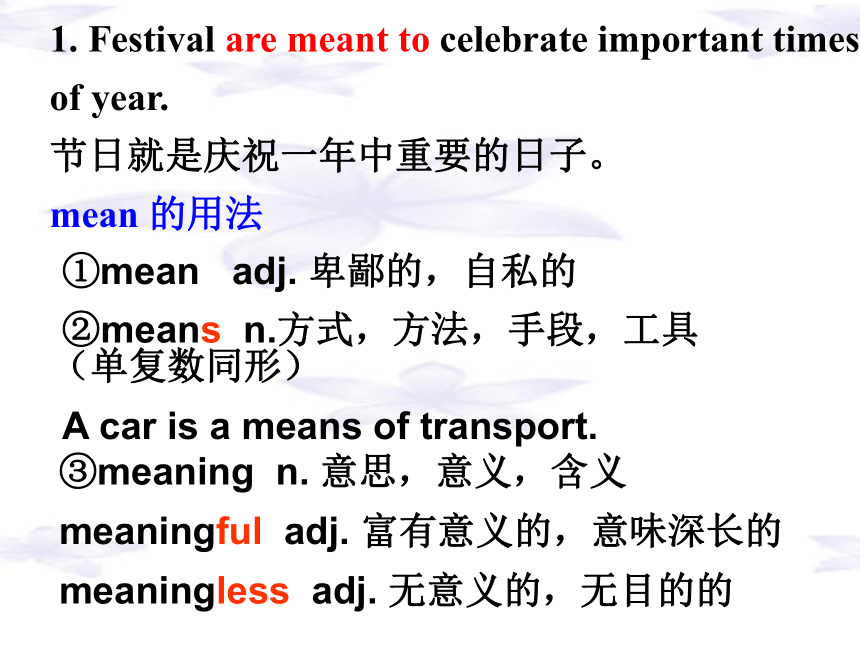
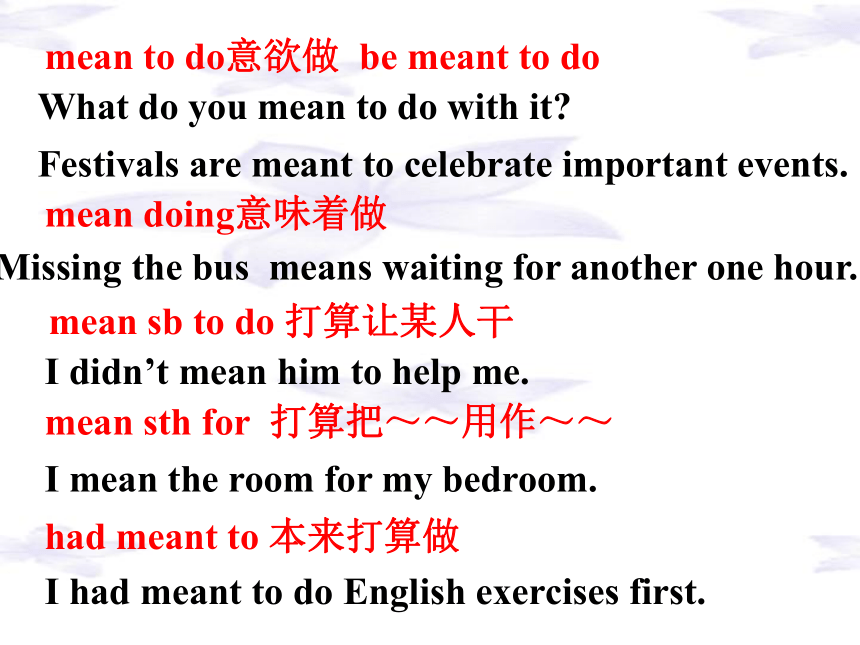
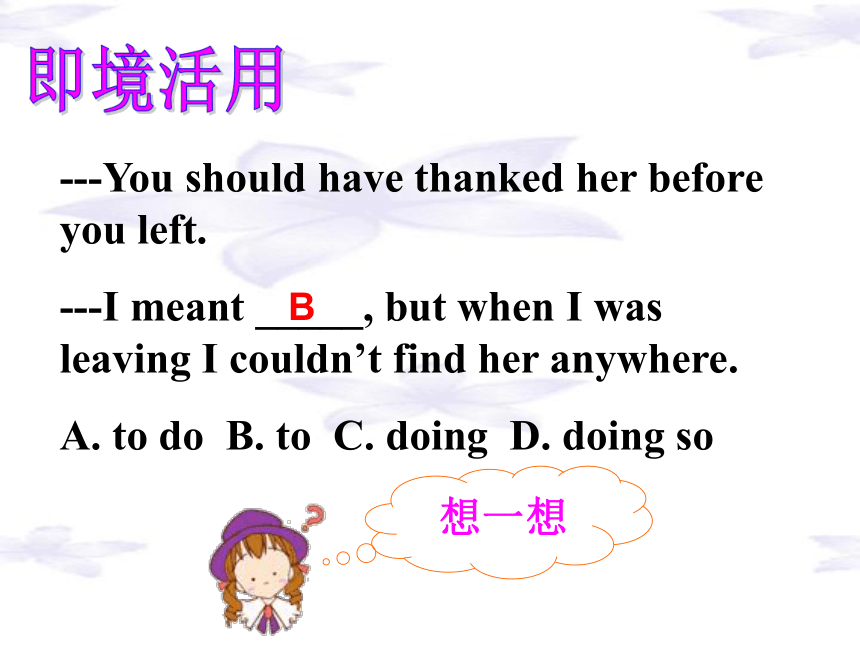
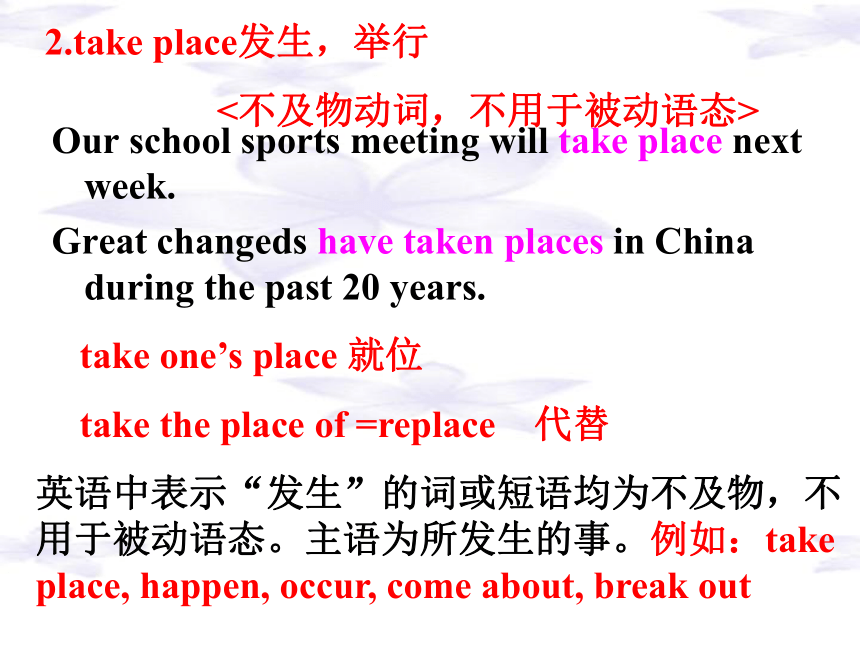
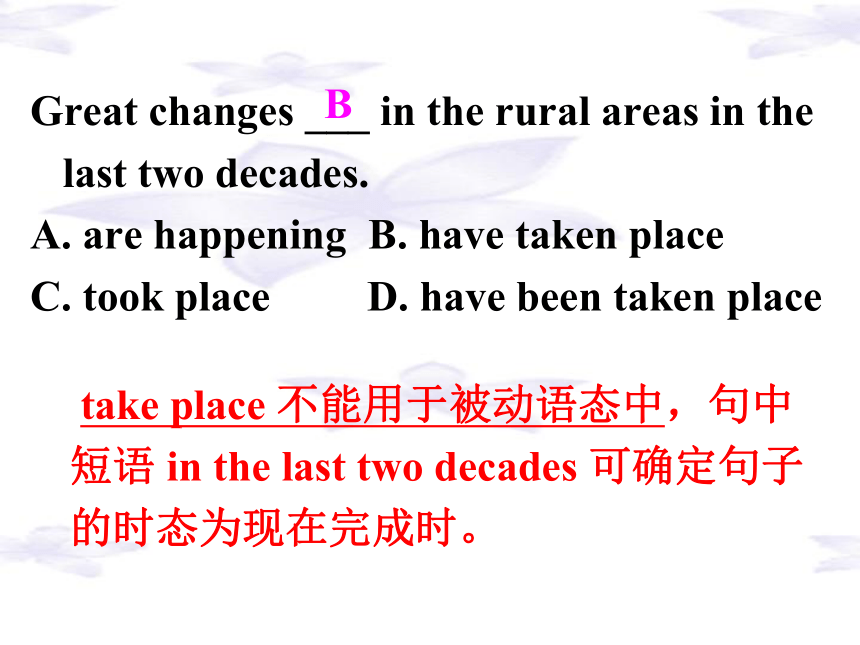
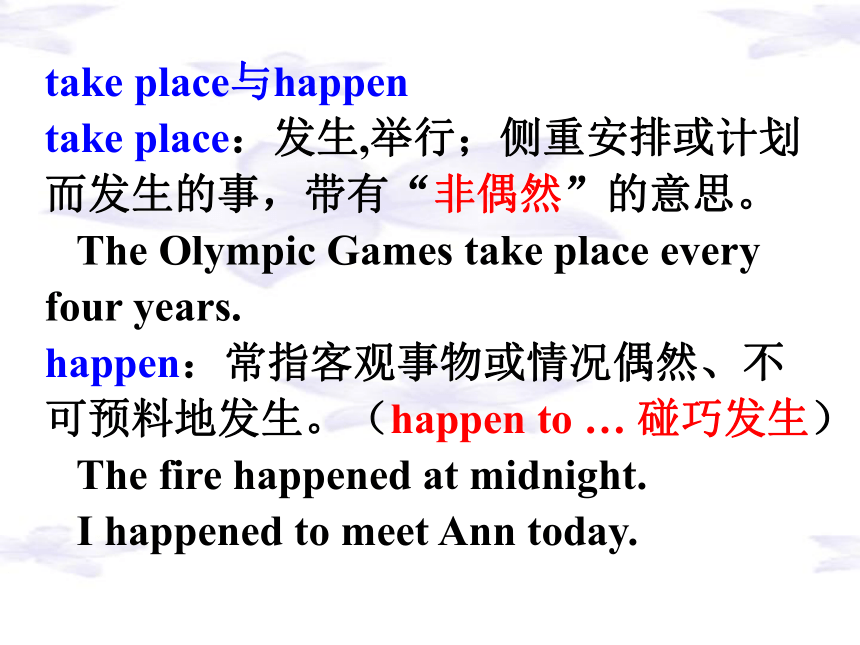
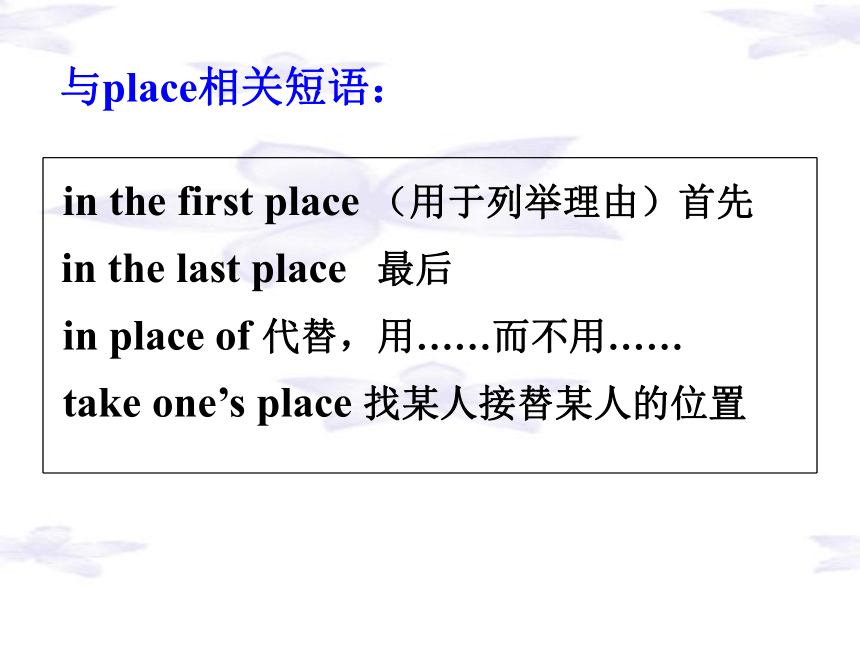
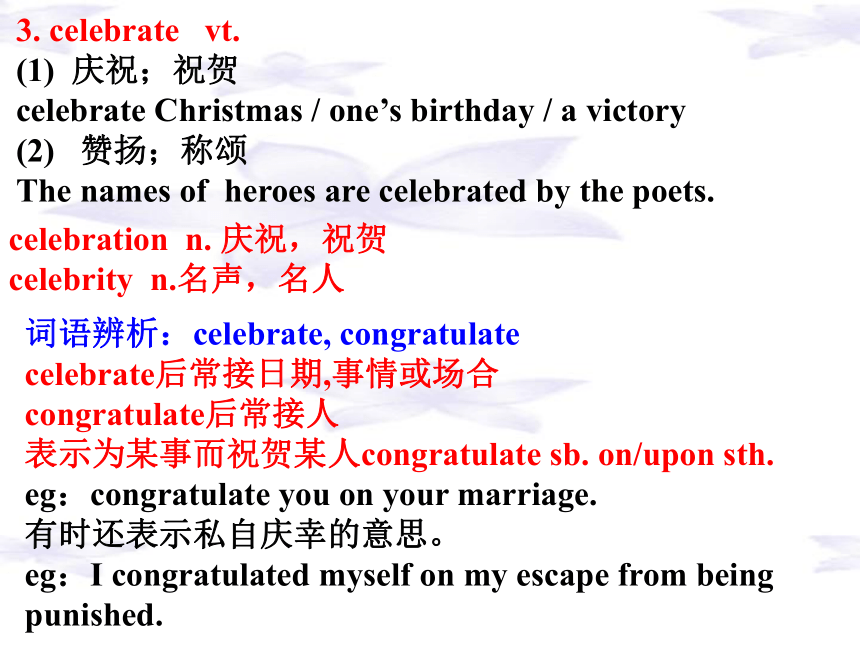
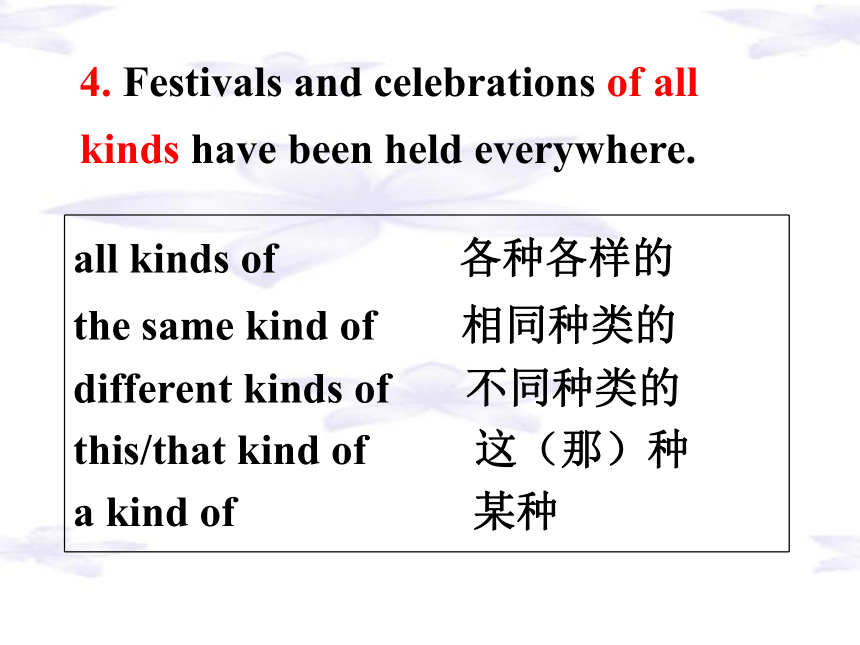
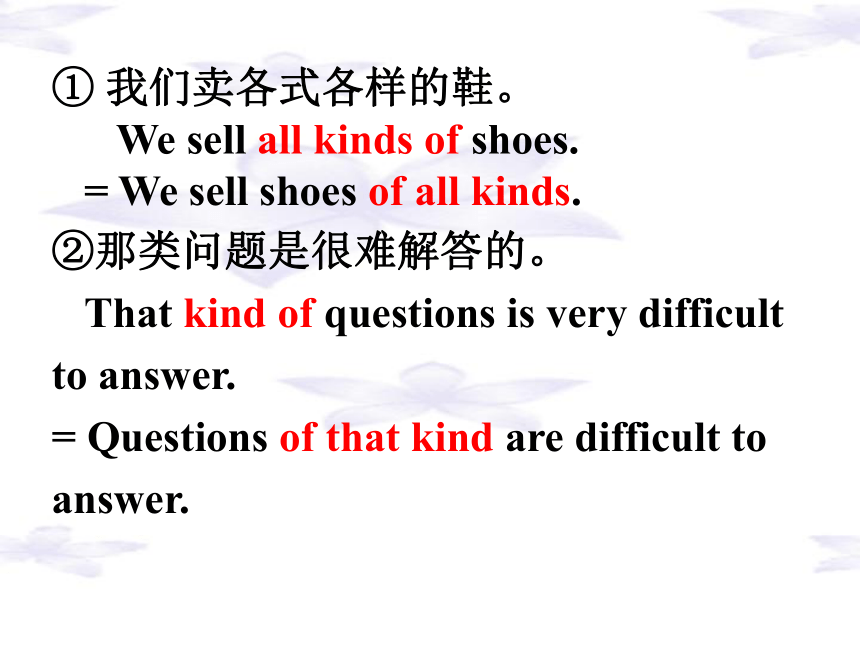
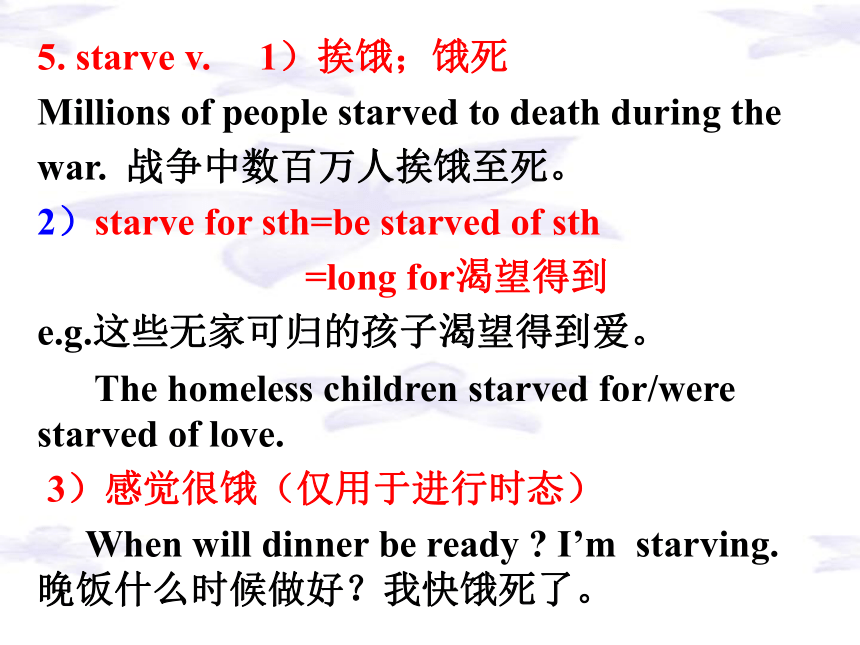
文档简介
Festivals
around the world
Language points
1. Festival are meant to celebrate important times of year.
节日就是庆祝一年中重要的日子。
mean 的用法
①mean adj. 卑鄙的,自私的
②means n.方式,方法,手段,工具 (单复数同形)
A car is a means of transport.
③meaning n. 意思,意义,含义
meaningful adj. 富有意义的,意味深长的
meaningless adj. 无意义的,无目的的
mean to do意欲做 be meant to do
What do you mean to do with it?
mean sb to do 打算让某人干
Festivals are meant to celebrate important events.
mean doing意味着做
Missing the bus means waiting for another one hour.
I didn’t mean him to help me.
mean sth for 打算把~~用作~~
I mean the room for my bedroom.
had meant to 本来打算做
I had meant to do English exercises first.
---You should have thanked her before you left.
---I meant _____, but when I was leaving I couldn’t find her anywhere.
A. to do B. to C. doing D. doing so
B
想一想
Our school sports meeting will take place next week.
Great changeds have taken places in China during the past 20 years.
2.take place发生,举行
<不及物动词,不用于被动语态>
take one’s place 就位
take the place of =replace 代替
英语中表示“发生”的词或短语均为不及物,不用于被动语态。主语为所发生的事。例如:take place, happen, occur, come about, break out
Great changes ___ in the rural areas in the last two decades.
A. are happening B. have taken place
C. took place D. have been taken place
B
take place 不能用于被动语态中,句中短语 in the last two decades 可确定句子的时态为现在完成时。
take place与happen
take place:发生,举行;侧重安排或计划而发生的事,带有“非偶然”的意思。
The Olympic Games take place every four years.
happen:常指客观事物或情况偶然、不可预料地发生。(happen to … 碰巧发生)
The fire happened at midnight.
I happened to meet Ann today.
与place相关短语:
in the first place (用于列举理由)首先
in the last place 最后
in place of 代替,用……而不用……
take one’s place 找某人接替某人的位置
3. celebrate vt.
(1)??庆祝;祝贺
celebrate Christmas / one’s birthday / a victory
(2)???赞扬;称颂
The names of heroes are celebrated by the poets.
celebration n. 庆祝,祝贺
celebrity n.名声,名人
词语辨析:celebrate, congratulate
celebrate后常接日期,事情或场合
congratulate后常接人
表示为某事而祝贺某人congratulate sb. on/upon sth.
eg:congratulate you on your marriage.
有时还表示私自庆幸的意思。
eg:I congratulated myself on my escape from being punished.
4. Festivals and celebrations of all kinds have been held everywhere.
all kinds of 各种各样的
the same kind of 相同种类的
different kinds of 不同种类的
this/that kind of 这(那)种
a kind of 某种
① 我们卖各式各样的鞋。
We sell all kinds of shoes.
= We sell shoes of all kinds.
②那类问题是很难解答的。
That kind of questions is very difficult to answer.
= Questions of that kind are difficult to answer.
5. starve v. 1)挨饿;饿死
Millions of people starved to death during the war. 战争中数百万人挨饿至死。
2)starve for sth=be starved of sth
=long for渴望得到
e.g.这些无家可归的孩子渴望得到爱。
The homeless children starved for/were starved of love.
3)感觉很饿(仅用于进行时态)
When will dinner be ready ? I’m starving. 晚饭什么时候做好?我快饿死了。
6. honour
n. 1) 光荣,荣誉
e.g.他们为了国家的荣誉而战。
They fight for the honour of the country.
2) in honour of 纪念…;向…表示敬意
e.g.这个节日是为了纪念英雄而确立的。
A festival is set in honour of the hero.
3) an hounour 光荣的人或事情
e.g.刘翔是我国的光荣人物。
Liu Xiang is an honour to our country.
vt. 4) 尊敬,给以荣誉
e.g.孩子们应该尊敬父母。
Children should honour their parents.
7. …or satisfy the ancestors , who could return either to help or to do harm.
1)do harm to sb/sth. =harm sbsth. 伤害…
e.g.在阳光下看书会伤害我们的眼睛。
Reading in the sun does harm to eyes.
2) satisfy vt. 满足,使…满意;
satisfied a.
satisfying a.
satisfaction n.
satisfactory a.
satisfactorily ad.
感到满意的;
令人愉快的
满意;
令人满意的
满意地
辨析 satisfactory, satisfied, satisfying
satisfactory, 指客观的事物或主观的表现达到要求而令人满意, 主语一般用客体。
satisfied指主体对事物或表现感到满意, 主语是主体
(人) She is satisfied with the service.
satisfying: giving pleasure令人愉快, 主语是不定式, 常用于句型:
It’s satisfying to do sth.
做…...使人满意如:It’s satisfying to learn the success of his son in job-hunting.得知儿子找到工作,令他非常高兴。
be satisfied with sb/sth 对...满意
be satisfied to do sth 对做...感到满意
to one’s satisfaction 使某人满意的是..
for from satisfactory 远非令人满意
I’m satisfied with what he did.
To my satisfaction, he passed the
exam.
Are you __________ to hear the ___________news?
Yes, I’m _______ with the news.
That is to say, the news _________me .
What about you?
Are you _________ ________ the news?
satisfied
satisfying
satisfied
satisfies
satisfied
with
hurt, injure, harm, damage, wound的
区别与用法
1)hurt 普通用语,既可指肉体上的伤害,
也可精神上, 感情上的伤害。
如:The girl hurt herself badly in the accident.
那位女孩在那次事故中伤得很重。
2)injure比hurt正式, hurt多指伤痛, 而injure则指损害健康, 成就, 容貌等,强调功能的损失。
如:He injured his hand while playing basketball.
他在打篮球时手受了伤。
3)damage主要指对于物的损害,强调对于价值、用途、外观等所造成的损失, 这种损失或因自然灾害所致, 或因人为造成。如:
Several cars were damaged in the accident.
好几辆汽车在事故中损坏了。
4) wound 指枪伤, 刀伤, 刺伤等皮肉之伤, 是出血的, 严重的伤, 特指战场上受伤, 它可以指肉体上的伤害, 也可指人们精神上的创伤。如:
? The bullet wounded his left leg.
子弹打伤了他的左腿。
5) harm用于肉体或精神上的伤害均可,有时可指引起不安或不便,还可用于抽象事物,尤其是指不道德的事情。
如:Don't harm your eyes by reading in dim light.
不要在昏暗的灯光下看书, 以免损害眼睛。
8. in memory of : 纪念,作为…的纪念
= to the memory of sb
The museum was built in memory of the famous scientist.
类似短语有:
in honor of 为了纪念
in favor of 有利于,支持,赞成
in charge of 主管负责
in need of 需要…时
in search of 寻找,搜寻
9. … because they think that this will lead the ancestors back to earth.
lead sb. to + n. ____________________
lead sb to do sth. ___________________
lead to + n. ________________________
e.g. 1) This street________________________.
你沿这条街走就可以到达车站。
2) What ______________________it?
什么使你相信它?
3)____________________________.
条条大路通罗马(殊途同归)
4)____________________________
______________________________.
勤奋就能成功,而懒惰导致失败。
带领某人通往/到……
使……做……
引领,通向;导致,招致
leads you to the station
led you to believe
All roads lead to Rome
Hard work leads to success,
while laziness leads to failure
10. feast : (1) n. 盛宴,宴会,节日,享受,
eg. a wedding feast
Spring Festival is an important feast to us.
The evening was really a feast for
music lovers.
(2) vt.宴请,款待
feast sb (with /on sth) : (用...)款待...
He feasted his friend with fish.
(3) 使(耳目)享受,
feast one’s eyes on ...
尽情享受,大饱眼福
eg. They’re feasting their eyes on
the beautiful scenery in the
countryside.
vi. 尽情地吃... feast (on sth)
eg. We feasted on the best food and drink.
11.They offer food, flowers and gift….
offer, provide, supply
offer :主动提供。offer sth to sb; offer sb sth
provide:供给(所需物,尤指生活必需品)。
provide sth (for sb); provide sb with sth.
supply: 供应(所需要或所要求之物)。
supply sth to/for sb; supply sb with sth
When I meet difficulty, my roommates will_____me help.
他们悬赏找回丢失的珠宝。
They_______a reward for the return of the lost jewels.
政府得提供这些老人们吃穿。
The government need to_________these old people
with food and clothes.
每个月都得供应足够的电。
Electricity should be _________enough every month.
offer
offered
provide
supplied
12. dress vt. (+sb./oneself) “给…穿衣服”。
e.g. 唤醒孩子,给他们穿上衣服。
Wake up children and dress them.
get dressed 穿衣服
be dressed in+衣服/颜色 “穿着……”
= be in+衣服/颜色
e.g. 这个女孩穿着一身红衣服。
The girl was dressed in red.
(1). ___in red, she looks more beautiful.
A. Dressing B. Dressed
C. Wearing D. Worn
(2). Little girls like ___beautiful clothes.
A. to dress up in B dressing up in
C. to dress up in D. dressing up
13. trick : n. 诡计,恶作剧,窍门
vt / vi 欺骗
the tricks of learning English
play tricks/a trick on sb
搞恶作剧,诈骗,开玩笑
trick sb into (doing) sth.
诱使某人(做)某事
He tricked me into giving him money.
~ sb out of sth 从某人处骗走某物
14. gain vt. & vi. 获得;赢得
(1)I have __________________________ since I arrived.
我到这里以后,结识了很多朋友。
(2)He had ________________ and looked much better.
他体重增加,脸色好看多了。
gained a lot of friends
gained weight
n. 收获
(1)No ______, no ______. 不劳无获。
(2)______ into the pit, ______ in your wit.
吃一堑,长一智。
pains
gains
A fall
a gain
15. award
n. 奖品,奖项,奖金, 助学金
Mary got an award and was able to finish her study.
vt. 授予……;裁定……
award sb. sth./sth. to sb. 授予某人某物 win/receive/get an award for
因……而获奖
(1)They __________ John the first prize.
他们授予约翰一等奖。
(2)He won _____________ his excellent skill.
他由于他出色的技能而获奖。
awarded
the award for
辨析: award 和reward:
award后接双宾语
award sb. a metal 授予某人奖章
reward 奖赏, 给…报酬, 不能接双宾语;
reward sb. for sth. 因 …奖赏某人;
reward sb. with sth. 用某物酬劳某人
He rewarded the boy for bringing back the lost dog.
He rewarded the boy with five yuan.
16.admire vt.
1) 钦佩,羡慕,赞美
eg.I admire him for his courage.
admire 表示此意时,常用于admire sb/sth 或
admire sb for sth结构,而不能说admire sb sth
2) 欣赏,观赏
eg. We stopped to admire the view.
admiration n. admiring adj. 佩服的,称赞的
wear a admiring look 带着称赞的表情
17. look forward to(介词) + n/ v-ing
盼望,期待
I’m looking forward to his coming.
look forward to 结构中的 to为介词,其后接名词或动名词(动词ing形式)。 类似的动词短语还有:
be/become/get used to 习惯于…… pay attention to 注意 devote...to... 把……致力于…… prefer...to...宁愿……也不……
18.all day and all night:
=day and night
= night and day整日整夜
all day long : 整天
day after day :日复一日(动作的重复)
day by day: 逐日地 (动作的变化)
They think of their motherland day and night.
It went on raining day after day.
The little boy grew up day by day.
19.clothing n. [u] [总称] 衣服,服装,
eg.The shop sells women’s clothing.
【辨析】clothing/clothes/cloth
1)clothing [u] 无复数形式,后面接单数动词,“一件衣服”要说an article of clothing或a piece of clothing,但不可以说a suit of clothing
eg. children’s clothing 童装
We’re well provided with food and clothing.
我们吃得好,穿得好。
2)clothes 统指身上各种服装,是复数名词,不能直接与数词连用,但可以和some,many,these 等词连用,后接复数动词。可以说a suit of clothes
3)cloth 当“布料” 讲时[u], “一块布”要说a piece of cloth; cloth 有时表示“特殊用途的一块布”[c]
eg. a table cloth 一块桌布
I need ______cloth, for I’m going to make_____
clothes.
A. a lot of; many B. much; much
C. many; many D. many; a lot of
I wanted to buy some _____for my little daughter,so I went to a shop selling children’s_____. A. clothes;clothes B. clothes; clothing
C. clothing;clothes D. clothing;clothing
21. The country is covered with cherry tree flowers so that it looks as though it might be covered with pink snow. 整个国度处处都是樱花盛开,看上去就像罩上了一层粉红的雪。
as though和as if没有什么区别。as if用得普遍些, 却可引导方式状语从句和表语从句, 其从句谓语常用虚拟语气。
虚拟语气(从句所用的时态比前面真实句子所用的时态倒退一个时态.)
(1) 引导方式状语从句
She acted as though nothing had happened.
她装得好像什么事也没发生过似的
当从句主语和主句主语一致,从句谓语中又有动词to be时, 可以把主语和to be一起省去。
He looked about as though (he was) in search of something.
他四处张望, 好像寻找什么。
(2) 引导表语从句
It looks as if it’s going to rain.
看样子天要下雨了。
2.陈述语气 (表示很可能的事实就用陈述语气), 常与seem ,look, smell, taste 连用。
It looks as if/ though it is going to rain.
as though和as if从句用虚拟语气,还是用陈述语气。完全根据具体情况而定。如果从句表示的意思与事实完全相反,或者纯粹是一种假设, 通常用虚拟语气。
The child talks as if she were an adult.
那孩子说话的样子好像她是个大人。
22. in/for fun :开玩笑地,为了好玩
make fun of := laugh at 嘲笑,讥笑
have fun with : 和...玩的快乐/ 开心
We had fun with each other at the party held last Sunday.
We are playing cards just for fun.
fun : n [u]
What fun it is to swim in summer!
His father is a man full of ___.
a fun B. the fun
C. Funny D. fun
D
23..fool n. 蠢人,傻瓜,白痴,受骗者
What a fool you were to believe him!
vt.&vi. 欺骗,愚弄,开玩笑,戏谑
You can’t fool me.
Don’t worry, he was only fooling.
foolish adj.愚蠢的,傻的,不明智的
make a fool of sb 愚弄、嘲笑某人
play the fool 装傻,胡闹,逗人笑
24.permission n. 允许,许可,批准
Did he give you permission to take that?
ask sb.for permission(to do sth.)
请求某人允许(做某事)
with/without one’s permission
经/未经某人的允许
permit vi./vt. ~sb to do sth.
permit doing sth
You should ask your mother for permission
to swim.
We can’t go out without the teacher’s
permission.
____the teacher’s permission, the students went to the playground to play basketball.
A. Under B. With
C Without D.For
around the world
Language points
1. Festival are meant to celebrate important times of year.
节日就是庆祝一年中重要的日子。
mean 的用法
①mean adj. 卑鄙的,自私的
②means n.方式,方法,手段,工具 (单复数同形)
A car is a means of transport.
③meaning n. 意思,意义,含义
meaningful adj. 富有意义的,意味深长的
meaningless adj. 无意义的,无目的的
mean to do意欲做 be meant to do
What do you mean to do with it?
mean sb to do 打算让某人干
Festivals are meant to celebrate important events.
mean doing意味着做
Missing the bus means waiting for another one hour.
I didn’t mean him to help me.
mean sth for 打算把~~用作~~
I mean the room for my bedroom.
had meant to 本来打算做
I had meant to do English exercises first.
---You should have thanked her before you left.
---I meant _____, but when I was leaving I couldn’t find her anywhere.
A. to do B. to C. doing D. doing so
B
想一想
Our school sports meeting will take place next week.
Great changeds have taken places in China during the past 20 years.
2.take place发生,举行
<不及物动词,不用于被动语态>
take one’s place 就位
take the place of =replace 代替
英语中表示“发生”的词或短语均为不及物,不用于被动语态。主语为所发生的事。例如:take place, happen, occur, come about, break out
Great changes ___ in the rural areas in the last two decades.
A. are happening B. have taken place
C. took place D. have been taken place
B
take place 不能用于被动语态中,句中短语 in the last two decades 可确定句子的时态为现在完成时。
take place与happen
take place:发生,举行;侧重安排或计划而发生的事,带有“非偶然”的意思。
The Olympic Games take place every four years.
happen:常指客观事物或情况偶然、不可预料地发生。(happen to … 碰巧发生)
The fire happened at midnight.
I happened to meet Ann today.
与place相关短语:
in the first place (用于列举理由)首先
in the last place 最后
in place of 代替,用……而不用……
take one’s place 找某人接替某人的位置
3. celebrate vt.
(1)??庆祝;祝贺
celebrate Christmas / one’s birthday / a victory
(2)???赞扬;称颂
The names of heroes are celebrated by the poets.
celebration n. 庆祝,祝贺
celebrity n.名声,名人
词语辨析:celebrate, congratulate
celebrate后常接日期,事情或场合
congratulate后常接人
表示为某事而祝贺某人congratulate sb. on/upon sth.
eg:congratulate you on your marriage.
有时还表示私自庆幸的意思。
eg:I congratulated myself on my escape from being punished.
4. Festivals and celebrations of all kinds have been held everywhere.
all kinds of 各种各样的
the same kind of 相同种类的
different kinds of 不同种类的
this/that kind of 这(那)种
a kind of 某种
① 我们卖各式各样的鞋。
We sell all kinds of shoes.
= We sell shoes of all kinds.
②那类问题是很难解答的。
That kind of questions is very difficult to answer.
= Questions of that kind are difficult to answer.
5. starve v. 1)挨饿;饿死
Millions of people starved to death during the war. 战争中数百万人挨饿至死。
2)starve for sth=be starved of sth
=long for渴望得到
e.g.这些无家可归的孩子渴望得到爱。
The homeless children starved for/were starved of love.
3)感觉很饿(仅用于进行时态)
When will dinner be ready ? I’m starving. 晚饭什么时候做好?我快饿死了。
6. honour
n. 1) 光荣,荣誉
e.g.他们为了国家的荣誉而战。
They fight for the honour of the country.
2) in honour of 纪念…;向…表示敬意
e.g.这个节日是为了纪念英雄而确立的。
A festival is set in honour of the hero.
3) an hounour 光荣的人或事情
e.g.刘翔是我国的光荣人物。
Liu Xiang is an honour to our country.
vt. 4) 尊敬,给以荣誉
e.g.孩子们应该尊敬父母。
Children should honour their parents.
7. …or satisfy the ancestors , who could return either to help or to do harm.
1)do harm to sb/sth. =harm sbsth. 伤害…
e.g.在阳光下看书会伤害我们的眼睛。
Reading in the sun does harm to eyes.
2) satisfy vt. 满足,使…满意;
satisfied a.
satisfying a.
satisfaction n.
satisfactory a.
satisfactorily ad.
感到满意的;
令人愉快的
满意;
令人满意的
满意地
辨析 satisfactory, satisfied, satisfying
satisfactory, 指客观的事物或主观的表现达到要求而令人满意, 主语一般用客体。
satisfied指主体对事物或表现感到满意, 主语是主体
(人) She is satisfied with the service.
satisfying: giving pleasure令人愉快, 主语是不定式, 常用于句型:
It’s satisfying to do sth.
做…...使人满意如:It’s satisfying to learn the success of his son in job-hunting.得知儿子找到工作,令他非常高兴。
be satisfied with sb/sth 对...满意
be satisfied to do sth 对做...感到满意
to one’s satisfaction 使某人满意的是..
for from satisfactory 远非令人满意
I’m satisfied with what he did.
To my satisfaction, he passed the
exam.
Are you __________ to hear the ___________news?
Yes, I’m _______ with the news.
That is to say, the news _________me .
What about you?
Are you _________ ________ the news?
satisfied
satisfying
satisfied
satisfies
satisfied
with
hurt, injure, harm, damage, wound的
区别与用法
1)hurt 普通用语,既可指肉体上的伤害,
也可精神上, 感情上的伤害。
如:The girl hurt herself badly in the accident.
那位女孩在那次事故中伤得很重。
2)injure比hurt正式, hurt多指伤痛, 而injure则指损害健康, 成就, 容貌等,强调功能的损失。
如:He injured his hand while playing basketball.
他在打篮球时手受了伤。
3)damage主要指对于物的损害,强调对于价值、用途、外观等所造成的损失, 这种损失或因自然灾害所致, 或因人为造成。如:
Several cars were damaged in the accident.
好几辆汽车在事故中损坏了。
4) wound 指枪伤, 刀伤, 刺伤等皮肉之伤, 是出血的, 严重的伤, 特指战场上受伤, 它可以指肉体上的伤害, 也可指人们精神上的创伤。如:
? The bullet wounded his left leg.
子弹打伤了他的左腿。
5) harm用于肉体或精神上的伤害均可,有时可指引起不安或不便,还可用于抽象事物,尤其是指不道德的事情。
如:Don't harm your eyes by reading in dim light.
不要在昏暗的灯光下看书, 以免损害眼睛。
8. in memory of : 纪念,作为…的纪念
= to the memory of sb
The museum was built in memory of the famous scientist.
类似短语有:
in honor of 为了纪念
in favor of 有利于,支持,赞成
in charge of 主管负责
in need of 需要…时
in search of 寻找,搜寻
9. … because they think that this will lead the ancestors back to earth.
lead sb. to + n. ____________________
lead sb to do sth. ___________________
lead to + n. ________________________
e.g. 1) This street________________________.
你沿这条街走就可以到达车站。
2) What ______________________it?
什么使你相信它?
3)____________________________.
条条大路通罗马(殊途同归)
4)____________________________
______________________________.
勤奋就能成功,而懒惰导致失败。
带领某人通往/到……
使……做……
引领,通向;导致,招致
leads you to the station
led you to believe
All roads lead to Rome
Hard work leads to success,
while laziness leads to failure
10. feast : (1) n. 盛宴,宴会,节日,享受,
eg. a wedding feast
Spring Festival is an important feast to us.
The evening was really a feast for
music lovers.
(2) vt.宴请,款待
feast sb (with /on sth) : (用...)款待...
He feasted his friend with fish.
(3) 使(耳目)享受,
feast one’s eyes on ...
尽情享受,大饱眼福
eg. They’re feasting their eyes on
the beautiful scenery in the
countryside.
vi. 尽情地吃... feast (on sth)
eg. We feasted on the best food and drink.
11.They offer food, flowers and gift….
offer, provide, supply
offer :主动提供。offer sth to sb; offer sb sth
provide:供给(所需物,尤指生活必需品)。
provide sth (for sb); provide sb with sth.
supply: 供应(所需要或所要求之物)。
supply sth to/for sb; supply sb with sth
When I meet difficulty, my roommates will_____me help.
他们悬赏找回丢失的珠宝。
They_______a reward for the return of the lost jewels.
政府得提供这些老人们吃穿。
The government need to_________these old people
with food and clothes.
每个月都得供应足够的电。
Electricity should be _________enough every month.
offer
offered
provide
supplied
12. dress vt. (+sb./oneself) “给…穿衣服”。
e.g. 唤醒孩子,给他们穿上衣服。
Wake up children and dress them.
get dressed 穿衣服
be dressed in+衣服/颜色 “穿着……”
= be in+衣服/颜色
e.g. 这个女孩穿着一身红衣服。
The girl was dressed in red.
(1). ___in red, she looks more beautiful.
A. Dressing B. Dressed
C. Wearing D. Worn
(2). Little girls like ___beautiful clothes.
A. to dress up in B dressing up in
C. to dress up in D. dressing up
13. trick : n. 诡计,恶作剧,窍门
vt / vi 欺骗
the tricks of learning English
play tricks/a trick on sb
搞恶作剧,诈骗,开玩笑
trick sb into (doing) sth.
诱使某人(做)某事
He tricked me into giving him money.
~ sb out of sth 从某人处骗走某物
14. gain vt. & vi. 获得;赢得
(1)I have __________________________ since I arrived.
我到这里以后,结识了很多朋友。
(2)He had ________________ and looked much better.
他体重增加,脸色好看多了。
gained a lot of friends
gained weight
n. 收获
(1)No ______, no ______. 不劳无获。
(2)______ into the pit, ______ in your wit.
吃一堑,长一智。
pains
gains
A fall
a gain
15. award
n. 奖品,奖项,奖金, 助学金
Mary got an award and was able to finish her study.
vt. 授予……;裁定……
award sb. sth./sth. to sb. 授予某人某物 win/receive/get an award for
因……而获奖
(1)They __________ John the first prize.
他们授予约翰一等奖。
(2)He won _____________ his excellent skill.
他由于他出色的技能而获奖。
awarded
the award for
辨析: award 和reward:
award后接双宾语
award sb. a metal 授予某人奖章
reward 奖赏, 给…报酬, 不能接双宾语;
reward sb. for sth. 因 …奖赏某人;
reward sb. with sth. 用某物酬劳某人
He rewarded the boy for bringing back the lost dog.
He rewarded the boy with five yuan.
16.admire vt.
1) 钦佩,羡慕,赞美
eg.I admire him for his courage.
admire 表示此意时,常用于admire sb/sth 或
admire sb for sth结构,而不能说admire sb sth
2) 欣赏,观赏
eg. We stopped to admire the view.
admiration n. admiring adj. 佩服的,称赞的
wear a admiring look 带着称赞的表情
17. look forward to(介词) + n/ v-ing
盼望,期待
I’m looking forward to his coming.
look forward to 结构中的 to为介词,其后接名词或动名词(动词ing形式)。 类似的动词短语还有:
be/become/get used to 习惯于…… pay attention to 注意 devote...to... 把……致力于…… prefer...to...宁愿……也不……
18.all day and all night:
=day and night
= night and day整日整夜
all day long : 整天
day after day :日复一日(动作的重复)
day by day: 逐日地 (动作的变化)
They think of their motherland day and night.
It went on raining day after day.
The little boy grew up day by day.
19.clothing n. [u] [总称] 衣服,服装,
eg.The shop sells women’s clothing.
【辨析】clothing/clothes/cloth
1)clothing [u] 无复数形式,后面接单数动词,“一件衣服”要说an article of clothing或a piece of clothing,但不可以说a suit of clothing
eg. children’s clothing 童装
We’re well provided with food and clothing.
我们吃得好,穿得好。
2)clothes 统指身上各种服装,是复数名词,不能直接与数词连用,但可以和some,many,these 等词连用,后接复数动词。可以说a suit of clothes
3)cloth 当“布料” 讲时[u], “一块布”要说a piece of cloth; cloth 有时表示“特殊用途的一块布”[c]
eg. a table cloth 一块桌布
I need ______cloth, for I’m going to make_____
clothes.
A. a lot of; many B. much; much
C. many; many D. many; a lot of
I wanted to buy some _____for my little daughter,so I went to a shop selling children’s_____. A. clothes;clothes B. clothes; clothing
C. clothing;clothes D. clothing;clothing
21. The country is covered with cherry tree flowers so that it looks as though it might be covered with pink snow. 整个国度处处都是樱花盛开,看上去就像罩上了一层粉红的雪。
as though和as if没有什么区别。as if用得普遍些, 却可引导方式状语从句和表语从句, 其从句谓语常用虚拟语气。
虚拟语气(从句所用的时态比前面真实句子所用的时态倒退一个时态.)
(1) 引导方式状语从句
She acted as though nothing had happened.
她装得好像什么事也没发生过似的
当从句主语和主句主语一致,从句谓语中又有动词to be时, 可以把主语和to be一起省去。
He looked about as though (he was) in search of something.
他四处张望, 好像寻找什么。
(2) 引导表语从句
It looks as if it’s going to rain.
看样子天要下雨了。
2.陈述语气 (表示很可能的事实就用陈述语气), 常与seem ,look, smell, taste 连用。
It looks as if/ though it is going to rain.
as though和as if从句用虚拟语气,还是用陈述语气。完全根据具体情况而定。如果从句表示的意思与事实完全相反,或者纯粹是一种假设, 通常用虚拟语气。
The child talks as if she were an adult.
那孩子说话的样子好像她是个大人。
22. in/for fun :开玩笑地,为了好玩
make fun of := laugh at 嘲笑,讥笑
have fun with : 和...玩的快乐/ 开心
We had fun with each other at the party held last Sunday.
We are playing cards just for fun.
fun : n [u]
What fun it is to swim in summer!
His father is a man full of ___.
a fun B. the fun
C. Funny D. fun
D
23..fool n. 蠢人,傻瓜,白痴,受骗者
What a fool you were to believe him!
vt.&vi. 欺骗,愚弄,开玩笑,戏谑
You can’t fool me.
Don’t worry, he was only fooling.
foolish adj.愚蠢的,傻的,不明智的
make a fool of sb 愚弄、嘲笑某人
play the fool 装傻,胡闹,逗人笑
24.permission n. 允许,许可,批准
Did he give you permission to take that?
ask sb.for permission(to do sth.)
请求某人允许(做某事)
with/without one’s permission
经/未经某人的允许
permit vi./vt. ~sb to do sth.
permit doing sth
You should ask your mother for permission
to swim.
We can’t go out without the teacher’s
permission.
____the teacher’s permission, the students went to the playground to play basketball.
A. Under B. With
C Without D.For
同课章节目录
